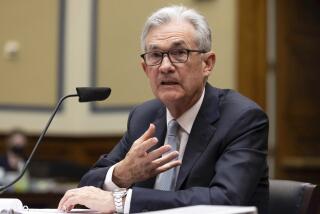Nine Things to Keep in Mind as the U.S. Recession Gets Deeper in 1992
- Share via
With the arrival of 1992, it is once again time to look over the coming year’s investment strategy in light of both national and global economic conditions.
In the United States, I expect a second leg to this recession. This is not a typical postwar slump driven by inventory building, and the as yet unresolved debt explosion of the past two decades will continue to plague the U.S. and foreign economies.
Another year of economic weakness will accelerate the decline in tangible asset prices--such as houses--further depressing the confidence of owners who were hoping for a price revival.
Confidence will be further undermined by mounting layoffs, particularly in the formerly “recession-proof” service industries, which now face severe pressure to cut costs because of direct foreign competition and demands for cost control by purchasers of services.
The renewed recession will make price increases impossible, and deep discounting will resume with the liquidation of unsold Christmas inventories. Deflation, not inflation, will be the threat in 1992.
Of course, recession in an election year will keep Washington panicky, making tax cuts likely, but with little resulting net fiscal stimulus, given the size of the federal deficit. Washington seems to understand that big tax cuts without some offsets from, say, defense spending cuts, could signal a complete lack of budgetary restraint. This could push up long-term interest rates, offsetting the stimulus of tax cuts.
Protectionism will expand in Western Europe and here at home, as unemployment grows and organized labor clamors for relief. Look for restriction on imports--directly and indirectly--from Japan.
Finally, the Common Market movement in Europe this year will be slowed by the disintegration of the Soviet Union and Eastern Europe and recession.
To sum up, here are nine things to keep in mind in 1992:
1) Long-term interest rates will fall. Therefore own high-quality bonds, especially Treasuries; government bonds of Japan, Germany, France and the United Kingdom should also do well in 1992.
2) Short-term interest rates will fall. We like short and intermediate-term high quality U.S. obligations, especially Treasuries. In addition, consider foreign government obligations--those of Japan, Germany, France and the United Kingdom.
3) Utility stocks will rise. Own high-quality utilities--stocks that look like bonds in terms of security of earnings and dividends--but take a note caution: Even the highest quality interest-sensitive utility can get dumped with everything else in a stock market rout, at least temporarily.
4) Cyclical stocks will fall. Avoid them, or sell them short. In our portfolios, we favor shorts on highly leveraged consumer stocks, potentially benefiting from the double whammy of weak consumer spending and excessive financial leverage.
5) Commodity prices will fall. Avoid or sell short industrial commodity-related firms, or short copper futures.
6) Oil prices will fall. Avoid or short firms whose earnings depend on high oil prices, or short oil futures.
7) Tangible asset prices will fall. Short-sell West Coast banks that are heavy in real estate. In the banking area, we’re also very comfortable with short positions on banks with large credit card loan exposure.
8) The dollar will be weak until the global recession is recognized, then it will be strong. My hunch is that the dollar’s weakness has about run its course, and it will rise soon in anticipation of a 1992 global recession.
9) The Japanese stock market will fall. Therefore, own put warrants on the Nikkei stock index. These should do well as recession and financial problems plague Japan, and as the price-earnings ratios on Japanese stocks sink to global levels.
More to Read
Inside the business of entertainment
The Wide Shot brings you news, analysis and insights on everything from streaming wars to production — and what it all means for the future.
You may occasionally receive promotional content from the Los Angeles Times.










